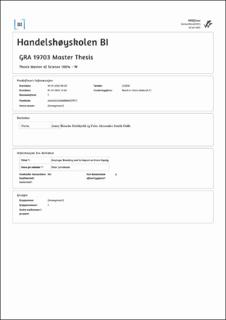Employer Branding and its Impact on Brand Equity : A study examining the influence that different employer branding initiatives have on brand preferences among consumers and employees
Master thesis
Permanent lenke
https://hdl.handle.net/11250/3033698Utgivelsesdato
2022Metadata
Vis full innførselSamlinger
- Master of Science [1621]
Sammendrag
For most firms the main objectives are to generate sales and profit. However,
behind the bases of generating sales and profits, there are a bunch of strategic
issues firms need to overcome when achieving success with its brand. The
concept of branding was initially related to products and services, but in recent
years branding have been developed into a larger scheme centered around design,
employers, events, and more. Traditional organizational structures accolade the
management of the human resources function to the Human Resources
department. However, recently firms have realized the benefits of managing
employees with a balanced internal (HR) and external (marketing) market
perspective to satisfy the needs and expectations of both employees and
consumers (King & Grace, 2009). Consequently, this thesis considers the
interaction between employer branding and marketing. More specifically, our
study aims to examine which employer branding initiatives firms should allocate
their resources to when the goal is to increase brand equity. This is done by
examining specific initiatives that are likely to attract and recruit new candidates,
but also by understanding whether it influences performance and brand awareness
among consumers. Our research explores the idea that employer branding is about
continued marketing, and the need to understand what it is like to work for an
organization. Firms that want their employees to stay loyal and live up to their
brand promise need to understand what drives commitments and engagement
(Kapoor, 2010). In this context, a combination between HR related activities and
strategic issues within marketing will be examined to understand which specific
employer branding initiatives that give a dual effect on employer branding and
consumer branding.
To gather insights, an online survey was distributed asking the participants to
choose between their preferences from both being in the position as a consumer
and an employee. The participants were asked to choose among different
3
employer branding attributes connected to multiple firms in different industries.
Based on the results that were analyzed using descriptive statistics, t-test, and
crosstabs, another survey was distributed to specifically HR- and marketing
practitioners. The idea was to get an understanding of what HR- and marketing
practitioners believe were the most effective employer branding initiatives to
boost brand equity and compare the results with insights gathered from consumers
and employees.
The results showed significant differences between responses from consumers and
employees compared with assumptions from practitioners in HR and marketing.
Among the specific employer branding initiatives that were examined, particularly
offering training and development opportunities to employees stood out as having
a high chance of attracting both consumers and employees. While other findings
suggests that some employer branding initiatives should only be used when
attracting employees, such as offering hybrid office. To our surprise, initiatives
concerned with economic factors ranked poorer than expected. Our aim is that this
paper can help practitioners clarifying some of their misconceptions in HR and
marketing while guiding firms to successful branding.
Beskrivelse
Masteroppgave(MSc) in Master of Science in Strategic Marketing Management - Handelshøyskolen BI, 2022
